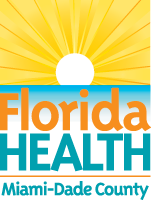QUIT SMOKING IN 2021 WITH THE HELP OF THE FLORIDA DEPARTMENT OF HEALTH IN MIAMI-DADE COUNTY
January 06, 2021
Contact:
Communications Office
(786) 336-1276
Miami, Fla. Choosing to quit smoking and protecting overall health and immune systems has never been more crucial than now. Tobacco Free Florida and Miami-Dade County are encouraging tobacco users to make a plan to quit smoking to improve their health in 2021.
Smoking harms nearly every organ of the body and effects a person’s overall health.[1],[2] Being a current or former cigarette smoker increases your risk of severe illness from COVID-19.[3] Smoking can cause a higher risk of getting lung and chest infections in general.[4] Smoking cigarettes is also a major cause of heart disease and lung disease.[5] People of any age with serious underlying health conditions, like heart disease and lung disease, seem to be at higher risk of developing complications from COVID-19.
“Quitting smoking is one of the most important steps you can take to improve your health,” said Dr. Yesenia Villalta, Health Officer/ Administrator of the Florida Department of Health in Miami-Dade. “Tobacco Free Florida and the Florida Department of Health in Miami-Dade Tobacco Prevention and Control Program encourage tobacco users to start the New Year out on the right foot by quitting smoking using the free and proven-effective resources available to all residents in Miami-Dade County.”
Tobacco Free Florida has a variety of free tools and services that can help people quit tobacco, including e-cigarettes. Free quit aids, like the patch or a combination of the patch and nicotine gum or lozenge, are offered by Tobacco Free Florida while supplies lasts and if medically appropriate. These services are available to Floridians across the state in every county regardless of insurance status.
Tobacco Free Florida encourages tobacco users in Miami-Dade County who want to quit to talk to their healthcare providers or to seek help from an evidence-based resource, like Tobacco Free Florida’s Quit Your Way program. Floridians can learn more about Tobacco Free Florida’s free tools and services by calling 1-877-U-CAN-NOW or visiting tobaccofreeflorida.com.
About Tobacco Free Florida
The Florida Department of Health’s Tobacco Free Florida campaign is a statewide cessation and prevention campaign funded by Florida’s tobacco settlement fund. Since the program began in 2007, more than 254,000 Floridians have successfully quit using one of Tobacco Free Florida's free tools and services. There are now approximately 451,000 fewer adult smokers in Florida than there was 10 years ago, and the state has saved $17.7 billion in health care costs.[6] To learn more about Tobacco Free Florida’s Quit Your Way services, visit www.tobaccofreeflorida.com or follow the campaign on Facebook at www.facebook.com/TobaccoFreeFlorida or on Twitter at www.twitter.com/tobaccofreefla.
[1] U.S. Department of Health and Human Services. The Health Consequences of Smoking—50 Years of Progress: A Report of the Surgeon General. Atlanta: U.S. Department of Health and Human Services, Centers for Disease Control and Prevention, National Center for Chronic Disease Prevention and Health Promotion, Office on Smoking and Health, 2014 [Accessed October 22, 2020.]
[2] U.S. Department of Health and Human Services. How Tobacco Smoke Causes Disease: What It Means to You. Atlanta: U.S. Department of Health and Human Services, Centers for Disease Control and Prevention, National Center for Chronic Disease Prevention and Health Promotion, Office on Smoking and Health, 2010
[3] Centers for Disease Control and Prevention. Coronavirus Disease, “People with Certain Medical Conditions” 2020. [accessed October 30, 2020.]
[4] U.S. Department of Health and Human Services. The Health Consequences of Smoking: 50 Years of Progress. A Report of the Surgeon General. Atlanta, GA: U.S. Department of Health and Human Services, Centers for Disease Control and Prevention, National Center for Chronic Disease Prevention and Health Promotion, Office on Smoking and Health, 2014. Printed with corrections, January 2014. [Accessed October 21, 2020.]
[5] U.S. Department of Health and Human Services. The Health Consequences of Smoking: 50 Years of Progress. A Report of the Surgeon General. Atlanta, GA: U.S. Department of Health and Human Services, Centers for Disease Control and Prevention, National Center for Chronic Disease Prevention and Health Promotion, Office on Smoking and Health, 2014. Printed with corrections, January 2014. [Accessed October 21, 2020.]
[6]Mann, Nathan M, Nonnemaker, James M., Thompson, Jesse. "Smoking-Attributable Health Care Costs in Florida and Potential Health Care Cost Savings Associated with Reductions in Adult Smoking Prevalence." 2016. [Accessed October 22, 2020.]




Connect with DOH